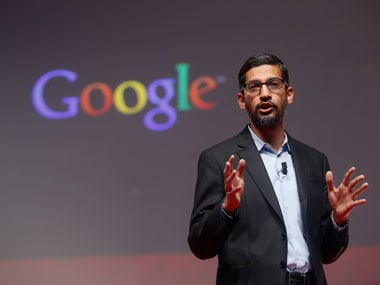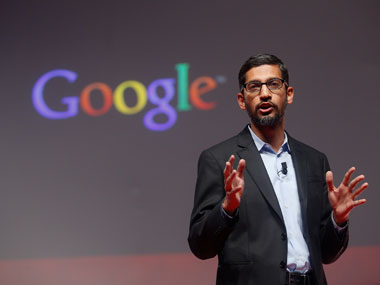A Google employee, now identified on Twitter as James Damore, shot off a mail, quite aggressive in content, on why gender diversity does not cut ice in the workplace. He argued that women had biological issues. So in the employee’s thinking that alone prevented women at the tech workplace from being as successful as men. Either Damore has a lot of time in his hands and not much work to have penned a 10-page memo, no less, at a time when Google is trying to defend a lawsuit against it from the US Department of Labour. The lawsuit alleges that the company pays its women employees far less than their male counterparts. What has now become the talking point after the mail went viral is CEO Sundar Pichai putting out a mail to employees that was contrary in nature. At one level Pichai defended the employee’s right to speak his mind by supporting “the right of Googlers to express themselves, and much of what was in that memo is fair to debate, regardless of whether a vast majority of Googlers disagree with it”. “However, portions of the memo violate our Code of Conduct and cross the line by advancing harmful gender stereotypes in our workplace,” he said in the mail. The verbal backlash on Twitter against Pichai is palpable: Good job @sundarpichai!! Now what about all the employees who said they agreed with the sexist stereotypes?
Damore: @Google does not value diversity of thought@sundarpichai: That’s a lie, and you’re fired for even thinking that.
Damore: @Google does not value diversity of thought@sundarpichai: That's a lie, and you're fired for even thinking that.
— Derek Hunter (@derekahunter) August 8, 2017
What is interesting to ponder upon is what would be the reaction if an employee gave vent to his/her thoughts on Indian turf? Would the CEO come out and publicly support his/her ‘right to express themselves’? [caption id=“attachment_2618274” align=“alignleft” width=“380”]  Google CEO Sundar Pichai[/caption] Firstpost spoke with a few human resource professionals to ascertain their views on the subject. Their views were mixed. Almost all of them said that comparing Google and an Indian firm would not be contextually right. For one, Google is a new age company, which has created a unique culture and an environment where employees can speak out, one of them said. In the Indian context, there are largely three kinds of companies, says Rajeev Bharadwaj, vice-president - HR, Sunlife Financial Asia Service Center. There are the proprietor family-run firms where talking against the companies is taboo. Secondly, the multi-national companies (MNCs) that have co-opted Indian organisations’ prevalent culture of conservatism. Here some leeway would be allowed to voice opinions about the company’s rules or culture. Third, the public sector units that have strict service rules about what can be said and done as an employee and talking about the organisation’s culture remains out-of-bounds, says Bharadwaj. India is anachronistic and is slowly unshackling itself. From a time when views about the company that were contrary to what the organisation upheld or believed in would be sacrilegious to say and even less to hear, to an age where organisational culture allows for employees to talk about their views regarding policies, etc, India Inc has traversed quite a journey but we are still evolving, say analysts. However, some people like the senior management in many organisations are allowed to speak up and air their views about the organisation, points out Sumit Sabharwal, CEO (managed services) & managing director (SAARC), Excelity Global, an HR outsourcing firm. He says that many companies have been able to make changes in services and products because of different voices being heard within organisations. All this boils down to one fact: That the Google employee’s mail was circulating in the company before it was tweeted and Motherboard published it. An employee should know where to air grievances before it becomes public. “It also points to the intent,” says Bharadwaj. Was the employee out to name and shame the company by putting the letter out in a forum where all employees could read it? Could he not have sent it to the concerned department in the organisation, he asks. Companies spend resources – money, people and time – promoting, safeguarding its image, product/service, and the brand. No company is going to let an employee fritter that away by comments that will work against it. Many times what is being said is heard only because of the position the employee holds within the company. “That is why organisations hire public relation firms to disseminate what they have to say. If organisations encourage all its employees to say what they felt personally about the company’s policies, the message of the company and what it stands for will be lost in the cacophony,” said Vidur Gupta, MD, Spectrum Talent Management, a global HR service provider. Though Sundar Pichai is of Indian origin, he has imbibed the culture of a top notch innovative and disruptive organisation like Google. In the Indian context, many employees won’t speak up even in town halls as opinions or thoughts contrary to the central philosophy of the organisation could cost the employee his/ her job. The Google employee who wrote the 10-page document highlighted so many issues that it is surprising he did not air it to the human resources department or the top management, said Sujaya Banerjee, chief executive officer, Capstone People Consulting, a consulting firm. “If, as Pichai said in his letter, employees need not be afraid to speak up at Google, then the letter would not have been in the public domain at all,” she says. Unlike Pichai, Indian organisations will not encourage employees speaking about company policies in public. “But even if Sundar Pichai did encourage and the employee continued to be employed after speaking up, it would be a matter of time before he was eased out. That he has been now is not surprising. For, the reasoning would be: If you are not happy with the organisation’s policies, you should work elsewhere," says Banerjee. Be it in India or the West, no company is that progressive to allow its policies to be lambasted in public. If an employee chooses to speak out, there are consequences. Like it has for Google engineer Damore.


)




